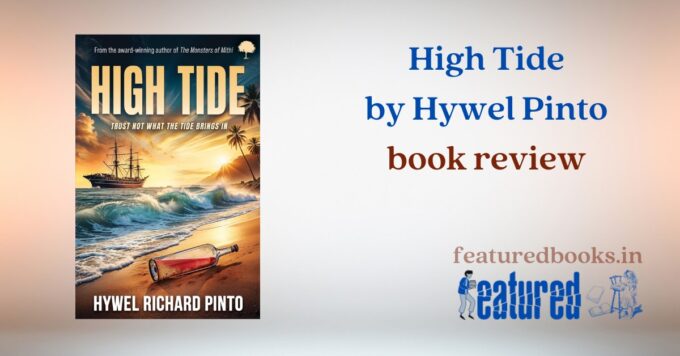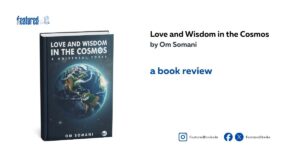Hywel Richard Pinto’s High Tide: Trust Not What The Tide Brings In is a work that invites multiple readings, and one of its greatest strengths lies in its ability to sustain interpretive depth while functioning as an engaging crime thriller. Where most novels in this genre rely heavily on the force of a single protagonist, Pinto diversifies the narrative by creating a constellation of characters, each playing a role in weaving the novel’s dense tapestry of secrecy and revelation. The interplay between these figures ensures that the novel is not restricted to the singular vision of Inspector Rojan Thimpu, although his presence remains central; instead, it is enriched by a chorus of voices and perspectives that complicate the pursuit of truth.
Among these figures, the undercover journalist stands out as one of the most compelling. While crime fiction often privileges the law enforcement perspective, Pinto inserts journalism as a counterweight to official investigation. The journalist is both insider and outsider, privy to information yet constantly at risk of discovery. Their role exposes the precarious balance between uncovering truths and protecting oneself from the violent reprisals of those in power. Pinto demonstrates remarkable acuity in depicting the ethical dilemmas of this character, who is caught between professional obligation and personal safety. The journalist thus represents an alternative model of inquiry, one that complements and occasionally contests the path taken by Inspector Thimpu.
Equally significant are the family members whose lives and secrets intersect with the crime. Pinto refuses to treat them as incidental or ornamental; instead, he invests them with psychological depth and narrative importance. The family secret at the heart of the mystery is not simply a plot twist but a revelation of how private histories become entangled in public crimes. The individuals connected to this secret are portrayed with nuance, their silences as telling as their spoken words. In their portrayal, Pinto underscores the idea that crime is never isolated. It ripples outward into the fragile web of relationships, unearthing wounds that many would prefer remain hidden.
The novel’s political dimension, embodied in the nexus between criminals and those in power, is fleshed out through characters who are not merely shadowy figures but are given a degree of presence that signals their significance. Pinto does not caricature politicians or their affiliates. Instead, he demonstrates how their ambitions, fears, and calculations shape the course of events. This realism strengthens the novel’s credibility and anchors its fiction in recognisable patterns of Indian socio-political life. By presenting these individuals with complexity, Pinto challenges the simplistic notion of good versus evil, instead revealing how crime and politics function in complicity to sustain each other.
The Sialkot operative subplot further expands the gallery of characters, linking the local with the international. The operatives are not portrayed as faceless threats but as agents with their own motives and strategies, thereby embedding the novel within a global framework of covert activity. Their presence highlights the vulnerability of local systems when confronted with the reach of international networks. The resonance of this subplot is particularly striking because it reveals how seemingly isolated crimes are in fact part of a larger machinery of cross-border interests. Pinto’s skill lies in weaving these characters into the narrative without diluting the centrality of Goa’s setting. Instead, the international dimension enriches the story, reinforcing the notion that crime is never confined to a single geography.
What distinguishes High Tide is not only its ensemble of characters but the way Pinto orchestrates their interactions. The narrative voice does not privilege one perspective to the exclusion of others. Instead, it shifts, allowing readers to inhabit multiple viewpoints and thereby experience the complexity of the unfolding events. This narrative strategy enhances suspense, for it resists the comfort of a single authoritative voice. The truth emerges gradually, through contradictions, partial disclosures, and the accumulation of detail across different characters’ experiences. This polyphonic quality aligns the novel with more ambitious works of crime fiction that transcend the formulaic and approach the condition of serious literature.
Another dimension worth noting is the portrayal of Goa itself, not only as a setting but as a character in its own right. Pinto’s descriptions carry a sense of familiarity with the rhythms of the place, from its landscapes to its social dynamics. Yet this is not the Goa of tourist brochures. It is a space layered with history, secrecy, and the tensions of modernity. The setting interacts with the characters, concealing as much as it reveals, thereby deepening the novel’s symbolic resonance. The tide, as suggested by the title, becomes an apt metaphor for the unpredictability of events, uncovering hidden truths even as it obscures clarity. This careful use of setting underscores Pinto’s ability to employ geography as more than a backdrop, transforming it into a narrative force.
Pinto also succeeds in exploring the psychological terrain of his characters. Inspector Thimpu is portrayed as having moments of doubt, hesitation, and vulnerability, which humanise him beyond his professional role. The journalist, as mentioned earlier, grapples with ethical dilemmas that reflect broader societal concerns about the role of the media in a democracy. Family members grapple with shame, loyalty, and fear, embodying the cost of secrecy. Even the operatives and political figures are given recognisable human traits, making them more than symbolic antagonists. This psychological realism elevates the narrative, ensuring that readers are not merely spectators of action but participants in the emotional and moral struggles of the characters.
Thematically, the novel explores the instability of truth. Every revelation is provisional, every certainty is questioned. Pinto carefully withholds information, releasing it at critical moments, ensuring that the reader’s journey mirrors the characters’ own search for clarity. The tide metaphor also operates at this thematic level, embodying the ebb and flow of knowledge. The novel compels readers to reflect on the precariousness of justice in societies where truth is systematically obscured by power. This reflection extends beyond the fictional world, resonating with real-world concerns about corruption, political complicity, and the suppression of dissent.
Pinto’s prose style facilitates this depth without sacrificing readability. His sentences are taut, his descriptions evocative yet restrained. Dialogue is employed effectively to reveal character and advance plot, while narrative exposition provides the necessary context without burdening the flow. This stylistic balance allows the novel to appeal to both casual readers seeking suspense and critics interested in literary qualities.
In the larger landscape of Indian English fiction, High Tide deserves recognition for its refusal to settle into a formula. It demonstrates that crime fiction in India can be both entertaining and intellectually provocative. It does not mimic Western models uncritically, nor does it reduce itself to local colour. Instead, it charts a middle path, grounding itself in Indian realities while engaging with global dimensions of crime and politics. This positioning reinforces the claim that Indian English writing is capable of producing genre fiction that stands alongside its international counterparts.
In the final analysis, High Tide: Trust Not What The Tide Brings In is a novel that rewards both casual engagement and critical scrutiny. Its ensemble of characters, from the resolute Inspector Thimpu to the risk-taking journalist, from family members guarding painful secrets to political figures safeguarding their interests, collectively creates a narrative that is at once gripping and thought-provoking. The presence of international operatives ensures that the novel’s horizons extend beyond Goa while its atmospheric depiction of the region roots it firmly in place. Pinto succeeds in crafting a narrative that entertains, unsettles, and invites reflection.
To read this novel is to recognise that crime is never a solitary act, but always embedded in structures of power, family, and history. The tide, as Pinto’s title reminds us, cannot be trusted to bring only comfort or clarity. It delivers the hidden, the painful, and the disruptive. Pinto has written a novel that compels us to acknowledge these truths, and in doing so, he has elevated the status of crime fiction within the field of Indian English literature.
Get a copy from Amazon India – click here.
Review by Priya for Featured Books
High Tide Trust Not What The Tide Brings by Hywel Richard Pinto Book Review
- Featured Books' Rating
Summary
A complete package that seamlessly blends political, crime thriller, mystery, and realism genres to keep readers engaged.





